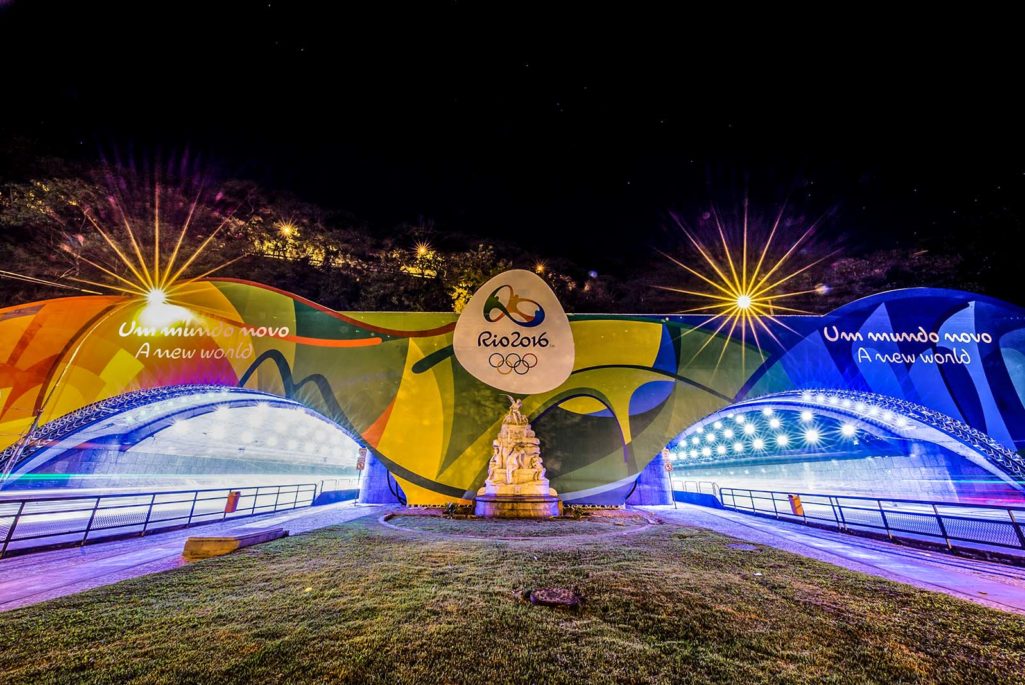The Olympics Will Be Fine; Worry about Brazil

A giant banner advertising the 2016 Rio Olympics is pictured outside a tunnel that connects Botafogo and Copacabana neighborhoods on July 5, 2016 in Rio de Janeiro, Brazil. Rio 2016 will be the first Olympic Games in Latin America. The event will take place between August 5th to 21st.
Photo: Buda Mendes/Getty Images
Since the modern Olympics were initiated in Athens in 1896, none of the 25 or so countries that have hosted the games have done so while confronting the political turmoil and economic distress now battering Brazil. Regardless, the games are likely to be a success, as the Olympics almost always are.
Back in October 2009, when Rio—known in Brazil as the “Cidade Maravilhosa” (The City of Wonders)—was chosen as the site for this year’s Olympics, massive celebrations broke out on the city’s beaches and streets and across Brazil. Brazilians were happy and proud to have outshined the other finalists, three of the world’s great cities—Chicago, Madrid and Tokyo—and hailed Brazil’s arrival as one of the world’s great countries.
Brazil’s economy, then the seventh largest worldwide, was booming, hardly scathed by the 2008 international financial crisis. Brazil’s recent discoveries of huge undersea oil reserves promised to make it a major energy producer and exporter. Adored at home and admired across the globe, President Luiz Inacio Lula da Silva was, according to U.S. President Barack Obama, the world’s most popular politician. To be sure, Brazil was still beset by poverty and inequality, rampant violence and corruption, but for the first time in nearly two generations, it was making remarkable progress on most of these fronts.
The Olympics—and the 2014 World Cup soccer tournament, also hosted by Brazil—were expected to showcase the country’s many accomplishments, but today, as the opening of this year’s Olympics fast approaches, Brazil has once again lost its way.
A deeply unpopular president, Dilma Rousseff, is on the verge of being impeached and replaced by her equally disliked vice president, Michel Temer—probably just after the Olympic crowds return home. The economy remains in a prolonged recession with no end in sight, while the country’s unruly congress squabbles over the adjustment measures needed for recovery. A series of massive bribery and kickback scandals, implicating large numbers of the country’s top political and business leaders, have left Brazilians profoundly distrustful of their government.
Whether the games are successful or not, Brazil will likely find itself with a tarnished image.
Brazilian officials claim that nearly all of the Olympic sites are set for the competition; however, independent observers are skeptical. Preparations are reportedly behind schedule and several of the venues may not be ready on opening day. Moreover, work appears to have been done haphazardly, with huge cost overruns, some likely due to corruption. Most related construction, including desperately needed upgrades to the city’s transportation system, has been lagging and will surely not be finished. A new bike path collapsed a few months ago, just before it was opened to the public. Work on promised public parks has hardly begun. Perhaps most discouraging, little headway has been made in clearing sewage and other waste from the currently contaminated sites for sailing, rowing and other outdoor water sports.
And there is more bad news. The State of Rio de Janeiro, which has primary responsibility for security matters, three weeks ago announced it was bankrupt and could no longer pay its workers or any of its other bills. So the federal government, which continues to run huge deficits, agreed to cough up nearly a billion dollars to assure that the police and firefighters, among other public servants, could be kept on the job and have money for gasoline and other essentials.
Public security is central concern. Rio has one of the world’s highest rates of violent crime and this year has seen an upsurge. Terrorism is also a danger. In recent weeks, ISIS and other groups, which have never been active in Brazil, have begun to issue threatening statements in Portuguese. It is reassuring that Brazilian authorities plan to have some 85,000 security forces on duty, both police and military. That is more twice the number London put on its streets when hosting the Olympics four years ago.
Brazil’s Zika virus epidemic has set off the loudest alarms for prospective visitors to the country. Pregnant women are advised not to travel to Rio. Despite the assurances of the World Health Organization and the U.S. Centers for Diseases Control and Prevention that the chance of infection are low during Rio’s winter months, tourists are wary and attendance at the games may suffer. Some athletes have declined to participate, but so far, only those involved in basketball, tennis, golf and men’s soccer, for instance, where the Olympic competition has only modest importance. In events such as track and field, gymnastics, swimming and diving, few competitors are likely to stay away. That is what should make this year’s Olympics a stunning spectacle of competition, and that is what will salvage the games for the billions worldwide who will be watching.
Yet, whether the games are successful or not, Brazil will find itself with a tarnished image. President Lula da Silva wanted the Olympics for Brazil, because almost all the world’s great countries have hosted the games. He knew that it would bring enormous publicity to Brazil and put the country on display. What he could not know was that the display would be so negative, that Brazil would fall so fast and so hard.
Thousands of journalists will be in Rio for the games, but they will surely be writing and reporting about much more—and what they say will all be magnified by social media. It will mostly be about Brazil today, not its past successes or whatever triumphs it may have in the future. Sadly, the real, substantial progress that has been made in the last 30 years, most of which will survive the country’s current turmoil, will likely be largely ignored.
Instead, it is poverty, disorder and physical dangers facing ordinary Brazilians that will be amply documented. So will the huge deficiencies of Brazil’s public services, its chaotic transportation and public health systems, and its fitful efforts to deal with endemic crime and violence. The biggest story will probably be the country’s insidious and pervasive corruption. No one is likely conclude that Brazil, a country with so many needs, made the right choice to put on a grand Olympic show, which will leave little of value behind.
Surely, the money could have been better spent, but, like so much other spending in Brazil, the costs and benefits were badly calculated. In fairness, however, Brazil has done no worse than most other countries sponsoring mega-sporting events or constructing grandiose athletic facilities. Costs everywhere are usually multiples of the amounts budgeted and they have only rarely produced much of a payoff anywhere, according to Andrew Zimbalist and other leading analysts of the economics of sports.
Sadly, the Olympics are not even going to provide Brazilians with much of a distraction from their problems. Almost immediately after the games conclude, the Senate is scheduled to vote on whether or not to impeach and permanently oust President Rousseff.


